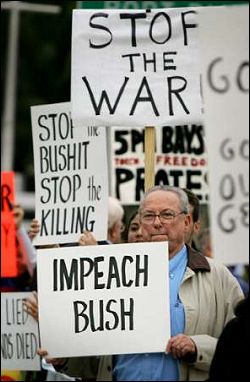Sister Margaret update
NUN'S SLAYING
Polygraph didn't lie, officials say
Defense lawyers dispute report priest failed exam
| Father Gerald Robinson, center, is surrounded by attorneys, from left, John Callahan, Henry Herschel, and Alan Konop, after a press conference yesterday in Mr. Konop’s offi ce. ( THE BLADE/DAVE ZAPOTOSKY ) |
Under attack for stating that murder suspect Father Gerald Robinson "failed" the first of two polygraphs, investigators yesterday stood by the results of the tests administered 24 years ago that indicated the cleric was being untruthful.
In a news conference earlier in the day, Father Robinson's defense lawyers questioned the validity of a lie detector exam Father Robinson took on April 18, 1980 - 13 days after Sister Margaret Ann Pahl was stabbed and strangled in the Mercy Hospital chapel.
Reading from the report by the polygraph examiner James Wiegand, attorney Henry Herschel said the examiner wrote that he "was of the opinion that truthfulness could not be verified."
"The examiner," Mr. Herschel said, "did not use the word 'failed' in his report."
Mr. Herschel, who represented the priest in 1980, was among the lawyers who appeared yesterday for a news conference to challenge the findings released in court documents Monday.
The records supported police searches last year at Toledo diocese offices by investigators who had reopened the murder case.
| Henry Herschel, left, Father Robinson’s former attorney, disputes the results of a 1980 lie detector test. With him are the priest, center, and attorney Alan Konop. ( THE BLADE/DAVE ZAPOTOSKY ) |
Mr. Herschel told the packed news conference that Father Robinson had been interrogated during two six to eight-hour sessions. Such stressful interviews are another reason to question the validity of the exam, Mr. Herschel later told The Blade.
"Whenever anybody was … under high stress back in those days it was very difficult to get a reading," he said.
A second exam was more reliable because the priest was no longer under that kind of anxiety, Mr. Herschel said. That report was "inconclusive."
In asking for a court order to search the Toledo Catholic Diocese offices last year for information on the murder case of Sister Margaret Ann Pahl, Toledo police Sgt. Steve Forrester wrote in an affidavit that Father Robinson had been an early suspect in the case.
Toledo police polygraph examiner Keefe Snyder, who reviewed the priest's polygraph exam yesterday, said the word "failed" was an accurate representation of the results.
Prosecutor Julia Bates also stood by the affidavits, adding in a brief, three-sentence statement that Mr. Herschel was paid by the diocese to represent Father Robinson in 1980. Mr. Herschel, though, told The Blade he has was not paid by the diocese nor did he consult with its hierarchy. He said he spoke to only one diocesan representative "and that was just to let him know what was going on."
The affidavits were released Monday after The Blade requested the records in a court motion. The documents offer insight into police suspicions of Father Robinson's possible involvement in the death of Sister Pahl.
But they also detail the frustration of investigators, who felt they were being misled by the diocese. Citing Canon Law, investigators said they believed that the diocese held secret files that might contain information about Father Robinson.
When investigators asked the diocese for any records about Father Robinson in 2003, they were handed "bare bones" information, records state. When they returned with a search warrant on Sept. 15, investigators removed 148 separate documents about the cleric.
Father Robinson is scheduled for trial on Oct. 17.






<< Home